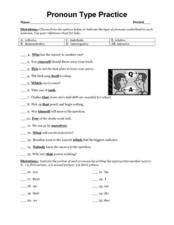K12 Reader
Reflexive Pronouns
I, myself, like a straightforward grammar exercise, and here is one about reflexive pronouns! Learners identify the reflexive pronoun in each of 20 sentences and indicate the subject that the pronoun refers to.
K12 Reader
Demonstrative Pronouns
Ask your pupils to demonstrate their understanding of demonstrative pronouns by completing this learning exercise. There are two parts to the exercise. First, learners identify the pronouns in sentences, and then they complete a short...
K!2 Reader.com
Interrogative Pronouns
To whom will you assign this exercise that focuses on interrogative pronouns? Your students, of course! Learners complete 18 sentences by adding in the correct interrogative pronouns. The page includes a list of pronouns to choose from...
K12 Reader
Object Pronouns Worksheet Two
Here is some basic practice with object pronouns. Learners find the object pronouns in each sentence and circle them. A brief definition of object pronouns and a list of object pronouns are provided at the top of the page.
K12 Reader
Subject Pronouns Worksheet Two
How well do your pupils know subject pronouns? Provide some practice with this straightforward worksheet. For 18 sentences, individuals circle the subject pronouns. A brief definition of subject pronouns and a list of subject pronouns...
K12 Reader
Possessive Pronouns
It's mine! No, wait, it's yours! Have your class members practice possessive pronouns so they can properly name who an item belongs to. For this exercise, pupils choose the correct possessive pronouns to complete 12 sentences.
K12 Reader
Pick the Pronoun
Which word is correct: he or him? Your pupils can practice determining if a sentence needs a subject or object pronoun by completing the 12 sentences on this worksheet. For each sentence, they are given an object pronoun and a subject...
K12 Reader
Object Pronouns
Take a stab at object pronouns with a straightforward exercise. Give an object, learners determine which object pronoun would be most appropriate to finish 25 sentences.
K12 Reader
Subject Pronouns
What or who can subject pronouns stand for? Ask your learners to determine the correct subject pronoun for 25 sentences. Learners are given the subjects and choose the pronouns from a chart of options.
Elementary AMC
Earth Day Grammar
Ensure you have a grammatically correct Earth Day with this series of task cards. Covering topics ranging from parts of speech and alphabetizing, to affixes and complete sentences, these Earth-themed exercises are a fun way for...
Jolly Learning Ltd
Jolly Grammar Action Chart
An excellent grammar reference page from Jolly Phonics provides definitions and actions to remember several fundamental parts of speech. The methods are interesting for learners who have a hard time remembering the differences between...
Millard South Patriots
Trait Practice: Sentence Fluency
Do your young writers need a little help varying their sentence structure? Have them work on common errors, sentence fluency, and writing patterns with a series of language arts activities. The resource includes reading passages as well...
Oxford University Press
Language Focus: Interrogative and Demonstrative Pronouns
Work on who, what, where, and how with several grammar activities. Additionally, kids complete sentences with demonstrative (relative) pronouns based on whether items are close or far away.
Curated OER
Subject Pronouns in Spanish
Starting off with examples and explanations of English subjects and pronouns, this resource explores Spanish subject pronouns in great detail. Each subject pronoun is described and paired with examples. Additionally, the material...
Curated OER
Its or It's
What's the difference between its and it's? Clear up any misunderstandings in your third grade language arts class. Practice sentences use its or it's twice, prompting learners to use context clues for each usage. At the end of the...
Curated OER
Scrutinizing Stand-Ins: Working With Nouns and Pronouns
Use the Schoolhouse Rock episode, "Rufus Xavier Sarsaparilla," to introduce a study of pronouns. Learners consider antecedents, cases (nominative, objective and possessive), as well as types of pronouns, and then craft sentences using...
Curated OER
English Grammar: Part of Speech
An uncountable noun? (Water) The Royal Order of Adjectives? (possession, quantity, quality, size, age, shape, colour, origin, material). Although this presentation on the English parts of speech is designed for language learners, the...
Curated OER
Pronoun Practice
Pronouns, pronouns, pronouns! There are so many different types, and understanding their usage can be quite tricky. A chart at the top of the first page gives examples of subject pronouns, object pronouns, possessive pronouns, and...
Curated OER
Apostrophe Errors
If you're tired of seeing it's instead of its"and who's instead of whose, this could be a great resource for you. Simple and straightforward, it provides eighteen opportunities for young learners to identify and correct words with...
Curated OER
Pronouns and Antecedents
When should you use a singular antecedent to agree with a collective pronoun? Give this review sheet to your class to clear up this common grammar mistake. Twenty questions challenge young readers to identify the correct pronoun using...
Curated OER
Worksheet 1: Review: Kinds of Words
By using this activity, learners identify nouns, verbs, adjectives, articles and prepositions. Budding grammarians fill in a 24-question chart in which they use the sentences given to categorize the words.
Curated OER
Reflexive Pronouns
What a great review of reflexive pronouns! Grammarians of all ages will benefit from this packet. The first page gives descriptions and examples of different reflexive pronouns and common mistakes. The second page holds two, short...
Curated OER
Pronoun Reference
Do your young readers have a hard time with using the correct pronouns? Use this resource to help them practice identifying and fixing incorrect pronouns. The worksheet includes twenty sentences, some of which need to be fixed, and some...
Curated OER
Pronoun Type Practice
Explore the world of pronouns; it's a lot bigger than you think! With reflexive, indefinite, relative, demonstrative, interrogative, and intensive pronouns, you have to give your class clear, easy to understand explanations. After...

























